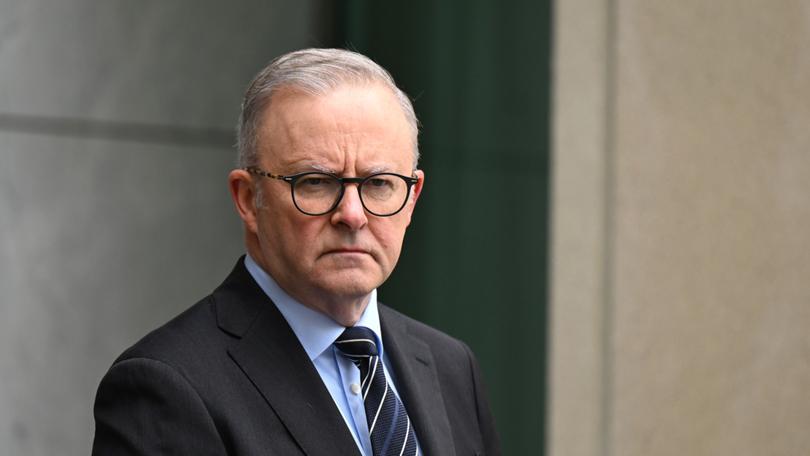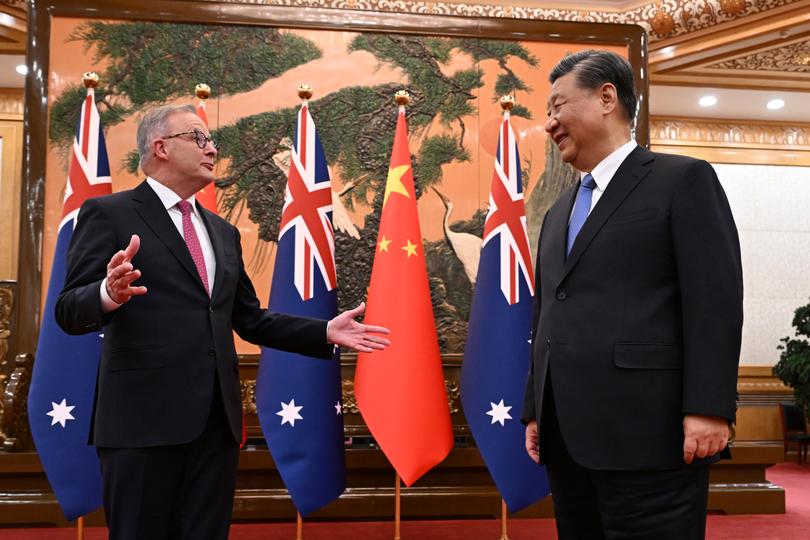Anthony Albanese blasts Chinese fighter jet’s ‘unprofessional’ and ‘unacceptable’ act near Navy
Australia should be imposing political or economic sanctions on China rather than merely expressing concerns over the latest dangerous military incident, a leading security expert says.

Australia should be imposing political or economic sanctions on China rather than merely expressing concerns over the latest dangerous incident between the two countries’ militaries, a leading security expert says.
A senior American official has also labelled the incident in which a Chinese fighter jet dropped flares in front of an Australian Navy helicopter “deeply concerning” and said it was incumbent on all countries to speak out against such unsafe and unprofessional behaviour.
Prime Minister Anthony Albanese said Australia had made “very strong representations” to express its outrage over the actions of the Chinese military, and Beijing would be “very aware of what our views are” on the incident.
Sign up to The Nightly's newsletters.
Get the first look at the digital newspaper, curated daily stories and breaking headlines delivered to your inbox.
By continuing you agree to our Terms and Privacy Policy.“We have raised it with Beijing,” he said.
“Australian Defence Force personnel were going about their job … in international waters, but also in international skies, to support the United Nations in the sanctions that they have against the North Korean regime.
“That is part of Australia being good global citizens and Australian Defence Force personnel should not be at risk whilst they’re doing that. So we have a very clear position there.”

China hit back late on Tuesday night, blaming Australia for the near miss.
“The Australian military aircraft flew near China airspace in a threatening way,” China’s foreign ministry spokesperson Lin Jian said.
“China military took necessary measures to warn Australian side.”
The incident occurred on Saturday in international waters in the Yellow Sea where Australia’s HMAS Hobart was taking part in Operation Argos, part of an ongoing global effort to enforce United Nations sanctions against North Korea.
A Royal Australian Navy MH-60R helicopter launched from HMAS Hobart, but was intercepted by a PLA-AF fighter aircraft that released flares along its flight path — posing a danger to the helicopter and crew onboard.
No injuries occurred and there was no damage to the helicopter.
The Nightly understands Australian Defence officials have raised the issue with their Chinese counterparts in Canberra, and the same has happened in Beijing.
The Government is waiting to see how China responds publicly before deciding whether to escalate these protests.
Chinese President Xi Jinping is currently visiting France, Hungary and Slovenia.
Reports of the incident came as the president warned the world was “far from calm” and called for a global truce to be agreed to during the Paris Olympics later this year.
It’s the latest in a string of run-ins with the Australian military, after Royal Australian Navy divers were injured in November when a Chinese warship used a sonar pulse while they were in the water.
In 2022, Defence revealed a P-8A Poseidon surveillance aircraft had been targeted with lasers and, a couple of months later, a Chinese fighter plane intercepted another Poseidon and released chaff near it.
US Assistant Secretary of State Daniel Kritenbrink, who is in Australia for talks with Defence, foreign affairs and other officials, says it’s part of a long pattern of behaviour from China that had also targeted American and other militaries operating “on the periphery of China”.
“China’s approach I think, generally speaking, has been to be more aggressive and assertive in its operations. And unfortunately, it’s led to these kinds of incidents,” he said.
“When we see China operating in a way that ... contravenes international law, that’s deeply concerning. I think it highlights all the more reason why we need to continue to operate in accordance with international law and, again, speak out when we see violations of that.
“This dangerous behaviour could lead to an accident, and worse, right, and we don’t want to see that.”
Malcolm Davis, a senior analyst with Defence think tank the Australian Strategic Policy Institute, said sometimes speaking out wasn’t enough.
He urged the Government to consider other actions, such as expelling diplomats, restricting Chinese students or tourists, or scaling back trade.
“There needs to be some sort of cost imposed, because otherwise, the Chinese will just shrug their shoulders at another Australian diplomatic note expressing concern and we’ll go on to the next incident, and then the incident after that,” he said.
“My concern is that at some point in the future, Australians will be either injured or killed as a result of their actions. And what do we do then? That’s the key question.”
Opposition leader Peter Dutton said Mr Albanese must call President Xi directly to express Australia’s position on China’s latest act of aggression, also warning the aggressive escalation could lead to a miscalculation and people dying.
But ANU China expert Ben Herscovitch said while it was important Australia register its anger, it was likely to have little effect.
“The Chinese military and by extension, the Chinese government … is in the business of testing foreign militaries and creating added risks for foreign militaries operating proximate to China and in international waters in international airspace,” he said.
“And Beijing, I don’t think, will be inclined to shift course just because of strong words issued by Australian officials or even the Australian Prime Minister or other world leaders.”
The incident complicates a thaw in the diplomatic freeze between the two countries, which has seen China drop most of the economic sanctions it slapped on Australia during the height of tensions in 2020.
High-level dialogue and ministerial meetings have also resumed, and China’s Premier Li Qiang is scheduled to visit Australia next month.
